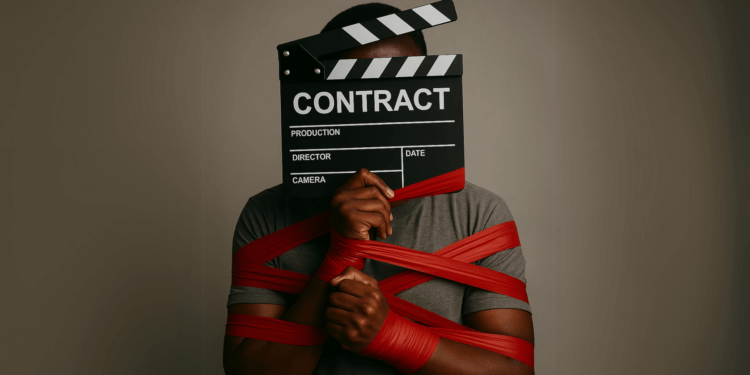Kenyan filmmakers and actors have many times been told to always read their contracts. They have also been told to hire lawyers to go through these contracts before signing. That it is better to pay a lawyer than lose your soul in the bottomless pit of a 32-page contract. This sermon has been preached over and over again.
But at this point, this repetitive barrage is counterproductive and to some extent, annoying. I say this as a fiction writer and also a lawyer who has actively worked in the media and entertainment industry for more than a decade. I have seen everything under the sun.
It doesn’t make sense to keep telling filmmakers and actors to be legally valiant when production companies and producers continue to operate outside the law with considerable levels of what can be termed as unchecked impunity.
Because even when a filmmaker does get a lawyer to read their contract, what is the outcome? It usually ends with them being stonewalled by the production company. Or worse, sometimes they’re blacklisted for being “difficult” for having the audacity to seek legal advice.
Which then leads to concerns about the knowledge and experience of the lawyer a filmmaker can afford based on the monetary value of the contract. Does this lawyer understand the origin and implications of the “standard industry clauses” in the contract? Do they understand the industry well-enough to negotiate for the filmmaker without them losing the contract or being blacklisted? Will this lawyer charge more for going beyond reading the contract and entering the time-sensitive, dark, dense and dicey realm of negotiating a contract with a production company?
And this is where three fundamental gaps and weakest links begin and end.
Lawyers who draft unlawful and unethical contracts for production companies and producers. One of the first things lawyers learn in contract law is what makes a contract enforceable. So why are we drafting contracts that cannot stand in court? Industry contracts, especially for cast and crew, are in all honesty, not legally binding and cannot be upheld in a court of law. We are just lucky that no one has tried to challenge them because the blacklisting culture in the industry, which is also unlawful. These contracts lack the element of mutual agreement and being mutually beneficial to both parties. They have a myriad of provisions that are contrary to the law and repugnant to justice. Most of the clauses are purely based on duress, making people act against their will because if they don’t, someone else will.
We are taught professional ethics in law schools and if you miss it in your undergraduate, you will most certainly not avoid it at the Kenya School of Law. The Law Society of Kenya also has a Code of Standards of Professional Practice and Ethical Standards with aspects of fidelity to the law and due process. Even if our clients’ interests are central, we have to use every cell in our very hyperactive brains to ensure those interests are within law and ethical and moral standards. That is why some law schools teach Critical Thinking and Writing as a full compulsory unit, so that we can think and create solutions within the law.
Production companies and producers that hire lawyers who draft one-size-fits-all template contracts. Why are you instructing lawyers to draft a contract that will apply to everyone in the same way? Why is a writer’s contract exactly like a director’s? They provide different services, have different working hours, have different rights within intellectual property law and create different implications within a working environment. Production companies never update these contracts to reflect changes in the law, emerging issues and fair working conditions for both employees and independent contractors. For example, the unholy clause on image, likeness, voice which I will deal with shortly.
Lawyers who review contracts without context and understanding of the industry. It’s really attractive for your profile when you call yourself an entertainment and IP lawyer. But you’re doing more harm to the industry when you don’t practice what you preach. When you don’t eat from the pot you claim to cook in. Every time I meet someone who calls themselves an entertainment lawyer, I get excited because we need more of them in this very unstructured industry. But then the rubber meets the road when you ask them about the last Kenyan album they listened to. Or the last Kenyan film or television series they watched. Or which actor came out on social media the other day to decry a bad contract they almost signed? Why is there a history of high turnover of actors and unexpected killing of characters on television series? Why is the situation between Nyashinski and Cedo interesting for lawyers? What hasn’t changed in the latest edition of the Communication Authority of Kenya’s Programming Code? Which bills are pending for the sector and why are they important? Crickets.
Now, this trio of failures has birthed a perfect storm for insurmountable illegalities, risks and an open field for regulators, county labour offices and courts to make judgments against production companies and producers. The thing is, you can pay actors and crew anything they accept (willing seller, willing buyer) because unfortunately, the industry is not structured enough to have standard pay rates across the value chain. But as a production company or a producer, you have to align your contracts with the law. On the very fundamental basis that all contracts must be mutually beneficial.
This time, we won’t tell filmmakers to hire lawyers. This time we are telling production companies and producers to get good lawyers and operate within the law. They must do legal audits and risk assessment because if they don’t then they, and the people who commission them to produce work, are at risk of legal and reputational damages. The world is changing and money is closely tied to what the law and reasonable human beings think or perceive of a situation.
And even if a filmmaker or actor cannot afford to sue, the law, with its long, extended arms, will find production companies culpable. For being contrary and repugnant through contracts that shatter people’s fundamental rights and freedoms, diminish their quality of life, destroy their self worth and leave them with unresolved trauma from what they now refer to as “anxious attachment to job offers”.
Legal compliance is a real thing and ignorance plus arrogance are not defences. Or maybe some production companies and producers have a considerable insurance cover against legal and reputational risks that allows them to continue as they were. For those who are going at it raw, please pay attention to just the following five, for now.
Likeness, voice and image of any cast or crew member do not belong to you or your commissioning partners. These are personal rights protected under the Constitution in the scope of the right to privacy. They are also covered under data protection and privacy laws as sensitive personal information. These are owned by the owners of the voice, likeness and image.
Therefore, your contract cannot state that they grant you these rights in perpetuity to use as you please. You are treading on dangerous grounds and your whole enterprise can be (and should be) shut down. You cannot use anyone’s likeness, voice or image for commercial purposes or “to pitch for additional funding” without their express and informed consent. This consent is not (and should not) be embedded within the contract. It must be obtained through a separate document – a consent form – and ideally, on a case-by-case basis depending on the intended use. And the consent form must not have unlawful and arbitrary statements because that creates the element of duress.
You may argue that you need the actor’s image, likeness and voice because that is the whole point of the production, and you are absolutely right. Get their proper informed consent for this through a consent form that is clear on where their image, likeness and voice will be distributed, by platform and territory. If you specify cinema, television, and streaming, then that is all it can be. Do no to use it elsewhere, including for purposes like training artificial intelligence models. That requires a different kind of consent because it raises severe ethical implications.
Anytime you wish to use someone’s image and likeness for anything other than what they consented to, you must go back and seek fresh consent. Also, let’s talk about this absurd habit of using the “Universe” as a territory for arbitrary use of someone’s image, voice and likeness. Which laws govern the Universe, which courts have jurisdiction in this Universe, where in this Universe can your dispute resolution clause and governing law clause fall. Can we be serious?
On top of that, if these uses are for commercial purposes of any kind, you must pay an extra fee on top of the actors’ fees. Of course, someone can waive the right to be compensated, but this has to be within the scope of informed consent and cannot be done under duress or through coercion.
Key takeaways here are these are not your rights; you must obtain proper, informed, written consent; and if you are using these personal rights for commercial purposes, pay every single time.
Crediting is a must. I have seen contracts that state the crediting of an actor or crew member is at the discretion of the production company or producer. Absolutely not. Under copyright laws, we have economic and moral rights. Crediting falls within the scope of moral rights. Meaning everyone has a right to be acknowledged for their work. This right is so fundamental that it cannot be assigned or transferred even upon death. Why are your contracts willingly and intentionally breaching international and Kenyan intellectual property laws? As a production company, you have no discretion or control over moral rights in copyright in Kenya, the world, or the “Universe” that you cite as territory in your contracts.
Is this an employment contract or a contract for services? Production companies and producers love to save money and operate on the concept of value for money. They will therefore have contracts drafted believing they’re hiring freelancers or independent contractors. But because they like to squeeze life out of the lemon, some get greedy and start adding employment language into the same contracts – terms like leave days, salary, overtime, suspension, deduction of salary due to negligence. On top of that the contract is for a period of more than 3 months.
So, what this implies is that the production company has created an employment relationship without even realising it. This is already a bad situation for the person being hired, but it is even worse for the production company. They have carelessly created an implied employment relationship, meaning that every single person on that set or production deserves and has a right to all the benefits of a formal employee under Kenyan law. If, for examaple, someone were to take that contract to the County Labour Office in Nairobi and a labour officer decided to visit your production…things will start biting each other. There are so many laws in this country that safeguard express and implied employees – including requirements around physical workplace conditions, safety, and employment policies. These laws also include the Health Act and the Mental Health Act. Are we together?
In addition, those arbitrary pay deduction statements in almost every clause in your contracts will become a bit tricky because under employment law, you are allowed to deduct peoples’ ‘salary’ for a defined level of negligence but even that is capped to the extent that it does not adversely affect their final take-home pay.
The moral of the story is, almost all production companies in Kenya have contracts for services that have employment language. This means that at this moment, right now at this instant, almost everyone working on a set is an implied employee with full rights under Kenya’s employment and labour laws, thanks to wrongly worded contracts. Whatever production houses and producers do with this information is out of my hands.
Arbitration for dispute resolution. Arbitration is expensive for everyone involved. The value of the contracts you issue to cast and crew and the overall budget for most productions, simply do not create any mutual benefit when arbitration is the default dispute resolution mechanism for every issue. If you’re unwilling to amicably resolve things through negotiation, you are better off going to court, specifically the Small Claims Court, which is more appropriate given the typical sums of money that have been “allowed” to move within the industry.
Finally, data protection and privacy. The law requires production companies to be registered with the Office of the Data Protection Commissioner as processors and controllers of personal information and sensitive information, including the “likenesses, voices and images” they are so obsessed with. Failure to do this is a breach and attracts hefty fines. But that is not why I am emphasising this. My key point is: as a production company, are you legally registered to collect, process and control people’s information to the extent that you can share people’s names, personal details and implied employment information and personal details for your industry blacklisting endeavours and “don’t hire this one” initiatives without their consent?
In conclusion, as we tell filmmakers and actors to be legally savvy, can we also urge production companies to do the bare minimum on legal compliance and not act outside the law with rampant unlawful and unethical contracts. It is good for their pockets, their reputation and will also save our courts a lot of time and resources.
Enjoyed this article?
To receive the latest updates from Sinema Focus directly to your inbox, subscribe now.












Very true am a victim of blacklisting due to legal questioning of.the contract terms..I pray one day Justice will come to be.